When dosed properly, melatonin supplements can help with sleep issues. But taking more than 5 mg of melatonin per night might not be the best choice for healthy sleep.

The Sleep Foundation reported that 50 to 70 million people in America have sleep disorders. So, it’s no surprise that melatonin supplements are a popular choice for people trying to get better rest. The goal of melatonin supplements is to help regulate the sleep-wake cycle, but dosing is the key to melatonin’s effectiveness. Taking too much melatonin can lead to potential side effects.
With just 3 mg per serving, our melatonin gummies for adults will calm your mind and body so you can catch your much-needed Zzzs.
What is Melatonin?
Melatonin is a hormone produced by the pineal gland, a small gland located in the brain. It plays a pivotal role in regulating the sleep-wake cycle and promoting the synchronization of various physiological processes within the day-night cycle. Based on reports by the National Library of Medicine, melatonin production is influenced by the amount of light detected in the retina, primarily through a specialized light-sensitive protein called melanopsin.
Melatonin production increases in the evening as natural light diminishes, reaching its peak during the night. Production decreases in the early morning as natural light returns. This cyclic secretion of melatonin helps create our internal biological rhythm, known as the circadian rhythm. This rhythm regulates our sleep-wake patterns, body temperature, hormone release, and other bodily functions.
Melatonin works by interacting with specific receptors in the brain and body, particularly the melatonin receptors MT1 and MT2. Activating these receptors helps induce feelings of drowsiness and initiates sleep processes. Melatonin is thought to help regulate the timing and duration of sleep stages, including REM sleep.
While melatonin is most widely recognized for its role in sleep regulation, it also has an impact on other biological processes. Melatonin has immunomodulatory properties that show potential for maintaining a balanced and efficient immune system. Its antioxidant properties help protect cells from oxidative stress and reduce the risk of cellular damage.
Melatonin also plays a role in regulating the secretion of some hormones in the body. Its effects on hormone secretion are closely tied to its role in regulating circadian rhythm. For example, melatonin levels rise in the evening and signal to the body that it’s time to wind down and prepare for sleep. This, in turn, affects the release of hormones like cortisol, which is associated with wakefulness and stress response.
People who struggle with sleep disorders and disruptions to their sleep patterns might choose to supplement with melatonin. These supplements are designed to provide an external source of melatonin to the body by mimicking the hormone’s effects. Supplements of melatonin can be synthesized chemically or extracted from natural sources like the pineal glands of animals or certain plants.
Melatonin supplements typically come in the form of a pill, sublingual liquid, or chewable. Quality and effectiveness can vary among brands and formulations. When choosing a melatonin supplement, select products from reputable manufacturers that adhere to quality control standards.
Our collection of melatonin gummies is made with plant-based, all-natural ingredients and flavors. You can check out our third-party lab tests that showcase the quality of our products.
Is 20 mg of Melatonin Safe to Take?
20 mg is not a recommended dose of melatonin. This is an extremely high melatonin dosage for adults. The average body’s natural melatonin production per night is 0.5 mg to 1 mg. Considering the natural melatonin production in the body, taking a melatonin dosage of 20 mg could lead to adverse effects. There is no official lethal dose of the supplement, and it’s unclear whether you can overdose on melatonin–but that doesn’t mean that you should take more than absolutely necessary.
A melatonin overdose could lead to unwanted side effects such as headaches, daytime sleepiness, dizziness, and digestive issues. According to an article by the Sleep Foundation, too much melatonin could negatively impact other important systems in the body. Excessive melatonin intake at high doses can potentially influence the cardiovascular system, leading to fluctuations in blood pressure and causing low blood pressure.
Taking too much melatonin can also impact cognitive function and mood response through the central nervous system. A very high dosage of melatonin can lead to mood swings and irritability that could exacerbate feelings of depression or anxiety.
Starting with the lowest dose possible is the best approach. 1 to 5 mg is the recommended melatonin dosage for adults. Effects of melatonin can vary based on things like your sleep condition, age, and weight, but starting with low doses will ensure you know how your body reacts to the supplement.
If you’re looking for an all-natural, high-quality melatonin sleep aid, check out our Sleep Plus Gummies. These plant-based edibles are gluten-free and fruit-filled with blackberry lavender flavors.
Can You Take Melatonin Twice in One Night?
While you can take melatonin twice in one night, it’s probably not a good idea.
Taking a second dose of melatonin after the first will not result in prolonged or enhanced sleep-inducing effects. The body naturally produces melatonin in response to darkness and the natural sleep-wake cycle. Taking melatonin supplements too close together might interfere with the body’s ability to regulate its melatonin production, potentially disrupting the natural sleep rhythm.
If you took the lowest dose of melatonin before bed and you don’t feel it worked, avoid taking another to fall asleep. Consider slightly upping your dose the following evening so you don’t experience melatonin’s side effects.
What are the Benefits of Taking Melatonin?
Melatonin sleep aids are beneficial for several types of circadian rhythm sleep disorders. These disorders are conditions that result from a misalignment between a person’s internal biological clock and the external environment, particularly the natural light-dark cycle. Circadian rhythm disorders can disrupt sleep patterns, making it difficult to fall asleep, stay asleep, and wake up at the desired time.
That’s why melatonin and sleep go hand in hand. For people who might be experiencing jet lag or who are shift workers struggling to reset their natural light-dark cycle, taking the recommended dose of melatonin can make it easier to transition to sleep and improve overall sleep hygiene. By promoting relaxation and reducing the time it takes to fall asleep, melatonin is also beneficial for managing insomnia.
Aside from offering a healthier alternative to other sleep medications, there are other key benefits associated with this “sleep hormone,” melatonin.
Research from the National Center for Biotechnology Information notes melatonin’s possible impact on women’s health. Melatonin inhibits estrogen-dependent signaling pathways, meaning it might have a role in slowing down or inhibiting the growth of estrogen-fueled breast tumors. By disrupting the signaling pathways that contribute to cancer cell growth, melatonin could act as an additional tool for cancer patients managing ER-positive breast cancer.
Though research is still limited, melatonin has been medically reviewed for its antioxidant properties and effects on men’s health and fertility. The study suggests that melatonin might help improve male reproductive health by protecting sperm from damage caused by harmful molecules called free radicals.
Antioxidants, including melatonin, neutralize free radicals by donating electrons. By doing so, melatonin can help prevent the chain reaction of oxidative damage. This reduces the release of pro-inflammatory molecules, interrupting the cycle of inflammation and tissue damage. Research on melatonin’s inflammatory properties shows its potential to help those who experience inflammatory pain from conditions like multiple sclerosis, rheumatoid arthritis, and psoriatic arthritis.
How Long Does it Take for Melatonin to Kick In?
The time it takes for melatonin to kick in depends primarily on how you consume this sleep medicine.
The most common ways to take melatonin are:
- Sublingually: Sublingual melatonin refers to taking liquid with a droplet under the tongue, allowing it to dissolve and absorb into the bloodstream. This method offers results rather quickly because it does not have to go through a digestive process before it hits the bloodstream. You can expect an onset as quick as 15 minutes.
- Edibles: Edible melatonin supplements, such as sleep gummies, need to be digested in the stomach before they’re absorbed into the bloodstream. This typically takes longer, around 30 minutes to an hour or more, depending on the individual. Our melatonin gummies have fast-acting results in as little as 15 minutes.
- Capsules: Melatonin capsules or pills are swallowed and must pass through the digestive system. Like edibles, capsules will take around 30 minutes to an hour or more to kick in. Try our full-spectrum Extra Strength Sleep Drops if you’re looking for a capsule that will promote better sleep.
Who Should Not Take Melatonin?
Melatonin is generally considered a safe supplement for short-term use. Some individuals should exercise caution or avoid taking melatonin for their sleep issues. Those with sleep apnea should refrain from taking melatonin, as it can worsen the condition. Sleep apnea is a disorder where there are recurrent episodes of interrupted breathing during sleep, often caused by a collapse of the upper airway.
Melatonin relaxes the muscles of the upper airway, including the muscles that help keep these airways open. This relaxation can exacerbate the airway collapse in people with sleep apnea, causing side effects like increased episodes of breathing interruptions.
Taking melatonin is also not recommended for those who have restless leg syndrome (RLS). This neurological disorder causes uncomfortable sensations in the legs, accompanied by an irresistible urge to move them. Melatonin supplements may alter dopamine activity, a neurotransmitter involved in RLS. This could lead to increased discomfort and disrupted sleep.
An article about melatonin from the Mayo Clinic reported that melatonin could impact the effects and safety of other medications. Those who have certain health conditions should consult with a doctor to be sure the drug interactions won’t conflict.
Melatonin could impact sugar levels, so people taking diabetes medications should proceed with caution. If you take anticoagulants or blood pressure medication, talk to your doctor before using melatonin. Melatonin can impact anticoagulants and blood pressure medications, too. Melatonin can increase the risk of bleeding and lower your blood pressure.
A study reported that progestin can increase melatonin levels in the body. If you’re taking birth control, talk to your doctor before taking melatonin, as progestin is commonly used in hormonal birth control methods.
Product QUIZ
Need help deciding what product is best for you? Take our quiz, just three questions until your perfect match!
Can You Take CBD with Melatonin for Sleep?
Both CBD and melatonin are known for their potential sleep-inducing properties, and their effects may complement each other. The way cannabidiol (CBD) improves sleep is a bit more indirect than melatonin. CBD has calming and anxiolytic effects that can promote relaxation, reduce nerves, and ease the mind. This could make for a quicker onset of sleep for those who struggle with their mental health and experience racing thoughts or anxiety before bed.
For people who experience pain that interferes with sleep, CBD’s pain-relieving and anti-inflammatory properties might be beneficial. By interacting with the pain receptors in the body’s endocannabinoid system, CBD can alleviate discomfort and promote better sleep quality.
We’ve got a collection of high-quality CBD gummies for sleep made with 100% organic, American hemp. Our edibles are made in compliance with the 2018 Farm Bill, making them federally legal to be shipped straight to your door.
Check out our Relax CBD Gummies with Ashwagandha in watermelon flavors to turn up the chill vibes and turn down the anxiety.
Melatonin FAQ
Is it bad to take melatonin every night?
Taking melatonin every night is considered safe for short-term use but is not intended to be used over an extended period. Taking melatonin for too long could disrupt the natural production of melatonin in the body. Some people might develop a tolerance to melatonin over time, meaning that the same dose may become less effective in inducing sleep.
Can you overdose on melatonin?
Though melatonin is not known to cause a fatal overdose, you can take too much and experience adverse effects. When taking more than the recommended dose, this dietary supplement could lead to side effects such as dizziness, nausea, daytime drowsiness, and headaches. Taking too much melatonin can also induce depressive thoughts and irritability.
What is melatonin good for?
Melatonin is good for people whose sleep-wake cycle is disrupted. It is best for shift workers who must adjust to changes in sleep schedules and travelers who experience jet lag. People who have insomnia might also take melatonin to induce a quicker onset of sleep and promote a more rested state of mind.
Is melatonin safe for kids?
Melatonin is generally safe for children with off-schedule body clocks or sleep issues. Reports by the American Academy of Sleep Medicine recommend parents only administer melatonin to their children under the care of a medical professional due to the risk of overdose and safety. The Sleep Foundation suggests the best melatonin dosage for children is between 0.5 mg to 3 mg per serving.
Consider adjusting your child’s mattress to help improve their sleep quality before offering them melatonin. Selecting the right mattress can make a big difference in your child’s sleep. A cooling mattress can help regulate their body temperature, promoting better sleep. You can also try a memory foam mattress. Memory foam is great for kids who are stomach sleepers, as it offers gentle cushioning that contours to their bodies. Mattress toppers can add an extra layer of comfort, especially if they have firm mattresses.
Can you take melatonin with alcohol in your system?
It is not advised to take melatonin with alcohol in your system. This is a common frequently asked question because many people struggle with sleep while under the influence of alcohol. Alcohol interferes with the body’s natural sleep patterns, but using melatonin can counteract its intended benefits when mixed with this substance.
Resources:
Suni, E., & Suni, E. (2023, May 18). Sleep Statistics. Sleep Foundation. https://www.sleepfoundation.org/how-sleep-works/sleep-facts-statistics
Tordjman, S., Chokron, S., Delorme, R., Charrier, A., Bellissant, E., Jaafari, N., & Fougerou, C. (2017, February 28). Melatonin: Pharmacology, Functions and Therapeutic Benefits. Current Neuropharmacology; Bentham Science Publishers. https://doi.org/10.2174/1570159x14666161228122115
Pacheco, D., & Pacheco, D. (2023, September 8). Can You Overdose on Melatonin? Sleep Foundation. https://www.sleepfoundation.org/melatonin/melatonin-overdose
Grant, S. G., Melan, M. A., Latimer, J. J., & Witt-Enderby, P. A. (2009, February 1). Melatonin and breast cancer: cellular mechanisms, clinical studies and future perspectives. Expert Reviews in Molecular Medicine; Cambridge University Press. https://doi.org/10.1017/s1462399409000982
Rocha, C. S., Rato, L., Martins, A. D., Alves, M. G., & Oliveira, P. F. (2015, May 27). Melatonin and Male Reproductive Health: Relevance of Darkness and Antioxidant Properties. Current Molecular Medicine; Bentham Science Publishers. https://doi.org/10.2174/1566524015666150505155530
Melatonin. (2023, August 10). Mayo Clinic. https://www.mayoclinic.org/drugs-supplements-melatonin/art-20363071
Brun, J., Bruno, C., & David, M. (1987, September 1). Urinary melatonin, LH, oestradiol, progesterone excretion during the menstrual cycle or in women taking oral contraceptives. European Journal of Endocrinology; Oxford University Press. https://doi.org/10.1530/acta.0.1160145
Farm Bill. (n.d.). USDA. https://www.usda.gov/farmbill
Health Advisory: Melatonin Use in Children and Adolescents. (2023, March 13). American Academy of Sleep Medicine – Association for Sleep Clinicians and Researchers. https://aasm.org/advocacy/position-statements/melatonin-use-in-children-and-adolescents-health-advisory/
nama CBD FDA & Legal Disclaimer
Our products are not intended to diagnose, treat, cure, or prevent any disease. They are not a replacement for prescription medications and have not been evaluated by the Food and Drug Administration (FDA).
The information provided on this website does not, and is not intended to, constitute legal advice or any statements of the status of any laws. Any information, content, and materials available on this site are for general informational purposes only, and are not intended to be relied upon for any purpose.
Readers of this website should contact their attorney to obtain advice with respect to any particular legal matter including decisions on what products are, or are not, legal to sell, possess, or consume. No reader, user, or browser of this site should act or refrain from acting on the basis of information on this site without first seeking legal advice from their own counsel in the relevant jurisdiction.
More articles
About
Learn
Join us on this journey

© Copyright 2025 nama Products LLC. All Rights Reserved.
†These statements have not been evaluated by the Food and Drug Administration. These products are not intended to diagnose, treat, cure or prevent any disease. All information presented here is not meant as a substitute for or alternative to information from health care practitioners. Please consult your health care professional about potential interactions or other possible complications before using any product.
††The information provided on this website does not, and is not intended to, constitute legal advice or any statements of the status of any laws. Any information, content, and materials available on this site are for general entertainment purposes only, and are not intended to be relied upon for any purpose.
123 John Doe Street
Your Town, YT 12345
Store Hours
Sun: Closed
Mon-Fri: 9:00 - 17:00
Sat: 10:00 - 13:00
What to expect at pickup
Closed
Closing at 5pm
Closing at 5pm
Closing at 5pm
Closing at 5pm
Closing at 5pm
Closing at 1pm

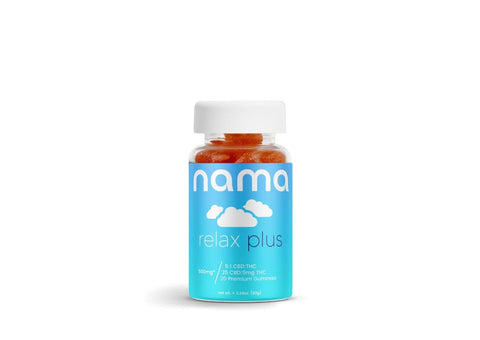

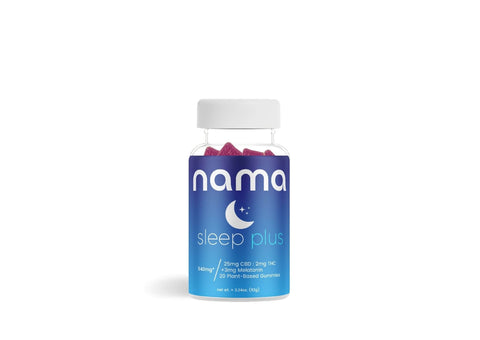
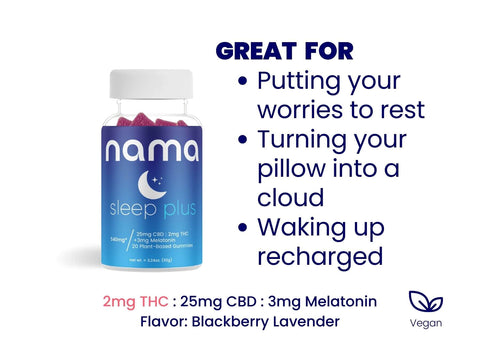
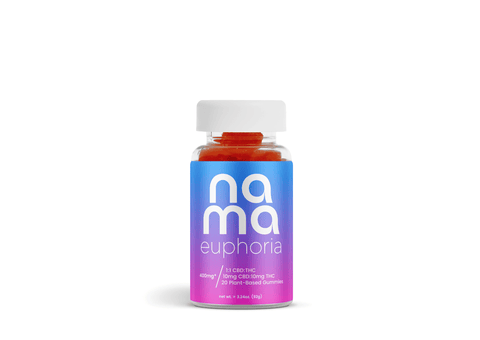

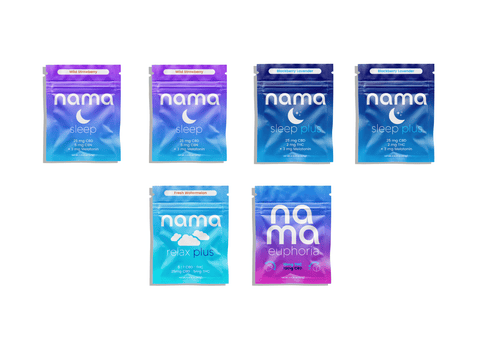
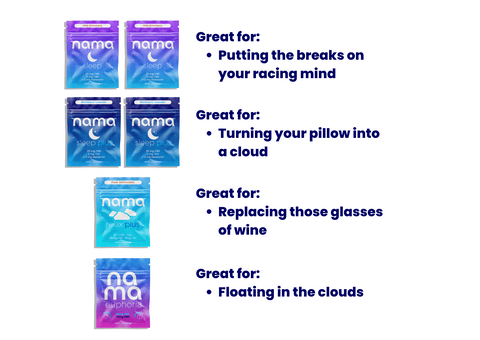
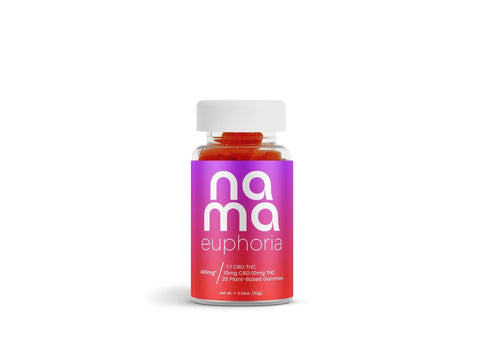

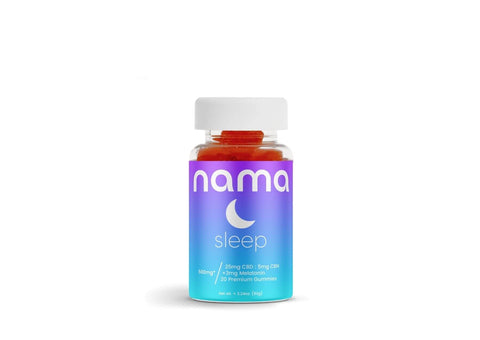

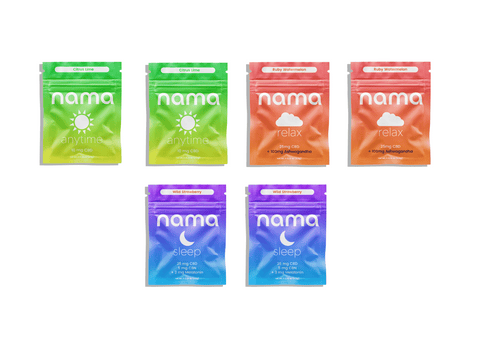
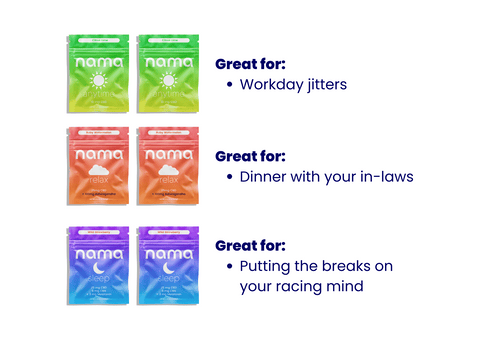









![Buzz Packs™ [THC and CBD Powder Drink Mix]](http://www.namacbd.com/cdn/shop/files/nama_buzz_packs_thc_drink_pack_white_background.png?v=1741884660&width=480)
![Buzz Packs™ [THC and CBD Powder Drink Mix]](http://www.namacbd.com/cdn/shop/files/Buzz_Packs_Label.png?v=1741884660&width=480)


![Buzz Drops™ [THC Drink Drops]](http://www.namacbd.com/cdn/shop/files/nama_thc_buzz_drops.png?v=1711412866&width=480)
![Buzz Drops™ [THC Drink Drops]](http://www.namacbd.com/cdn/shop/files/buzz-drop-wine-comparison.png?v=1736882023&width=480)



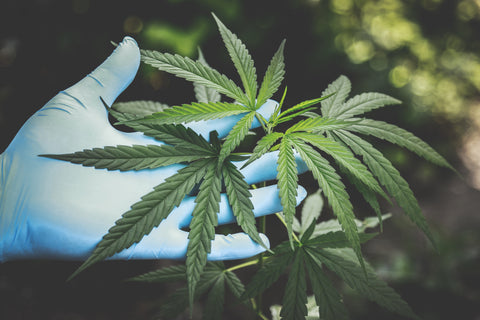


Comments (0)
There are no comments for this article. Be the first one to leave a message!